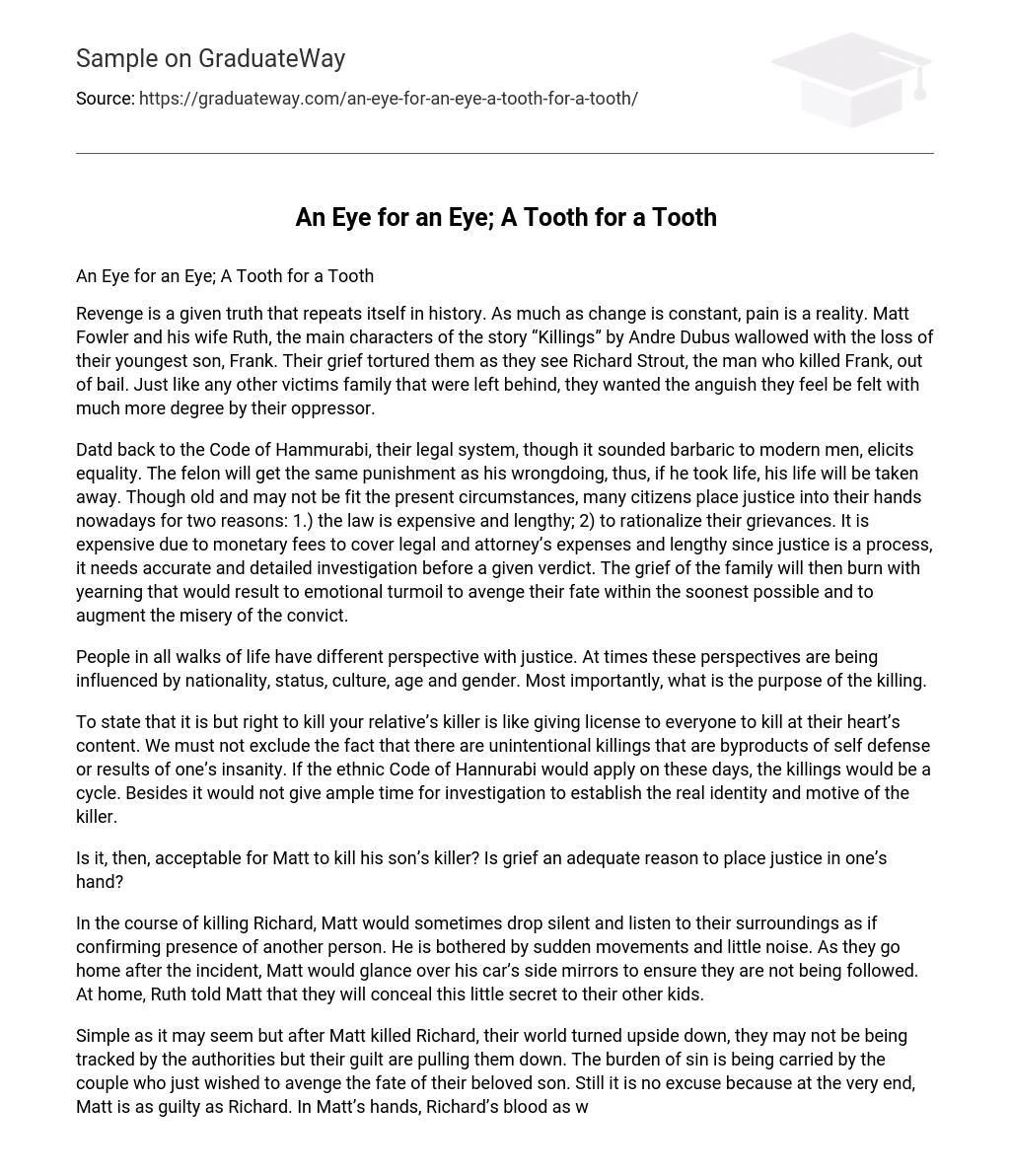An Eye for an Eye; A Tooth for a Tooth
Revenge is a given truth that repeats itself in history. As much as change is constant, pain is a reality. Matt Fowler and his wife Ruth, the main characters of the story “Killings” by Andre Dubus wallowed with the loss of their youngest son, Frank. Their grief tortured them as they see Richard Strout, the man who killed Frank, out of bail. Just like any other victims family that were left behind, they wanted the anguish they feel be felt with much more degree by their oppressor.
Datd back to the Code of Hammurabi, their legal system, though it sounded barbaric to modern men, elicits equality. The felon will get the same punishment as his wrongdoing, thus, if he took life, his life will be taken away. Though old and may not be fit the present circumstances, many citizens place justice into their hands nowadays for two reasons: 1.) the law is expensive and lengthy; 2) to rationalize their grievances. It is expensive due to monetary fees to cover legal and attorney’s expenses and lengthy since justice is a process, it needs accurate and detailed investigation before a given verdict. The grief of the family will then burn with yearning that would result to emotional turmoil to avenge their fate within the soonest possible and to augment the misery of the convict.
People in all walks of life have different perspective with justice. At times these perspectives are being influenced by nationality, status, culture, age and gender. Most importantly, what is the purpose of the killing.
To state that it is but right to kill your relative’s killer is like giving license to everyone to kill at their heart’s content. We must not exclude the fact that there are unintentional killings that are byproducts of self defense or results of one’s insanity. If the ethnic Code of Hannurabi would apply on these days, the killings would be a cycle. Besides it would not give ample time for investigation to establish the real identity and motive of the killer.
Is it, then, acceptable for Matt to kill his son’s killer? Is grief an adequate reason to place justice in one’s hand?
In the course of killing Richard, Matt would sometimes drop silent and listen to their surroundings as if confirming presence of another person. He is bothered by sudden movements and little noise. As they go home after the incident, Matt would glance over his car’s side mirrors to ensure they are not being followed. At home, Ruth told Matt that they will conceal this little secret to their other kids.
Simple as it may seem but after Matt killed Richard, their world turned upside down, they may not be being tracked by the authorities but their guilt are pulling them down. The burden of sin is being carried by the couple who just wished to avenge the fate of their beloved son. Still it is no excuse because at the very end, Matt is as guilty as Richard. In Matt’s hands, Richard’s blood as well, is crying for justice.
In the New Testament, God was asked how many times we should forgive our brothers who have wronged us and He answered seventy-seven times, and only to mean that we should give unlimited forgiveness because His grace is sufficient. In the book of John, an adulterous woman was about to be stoned to death but Jesus said to the crowd that the first stone should be thrown by a person without sin. The crowd departed and God told the woman before she left not to sin again.
God did not say our laws are useless and insignificant. God did not point out that we should remove our judicial system. But God teaches us that forgiving is a moral act, no matter how difficult it could be. Still, we should also be responsible of it once we are forgiven, thus, as Jesus told the woman, we must not sin again. Accordingly, He gave us free will and we must act upon it in maturity and with all responsibility. Each country has distinctive law to suffice justice and order in one’s land and each government acknowledges the necessity of punishment. The offender will then serve behind bars to teach him morality, to reflect on his sins, to seek forgiveness and remose and to give him a chance to start a new life.
Mahatma Gandhi, a well-known political and spiritual leader once said; “An eye for an eye makes the whole world blind.”





